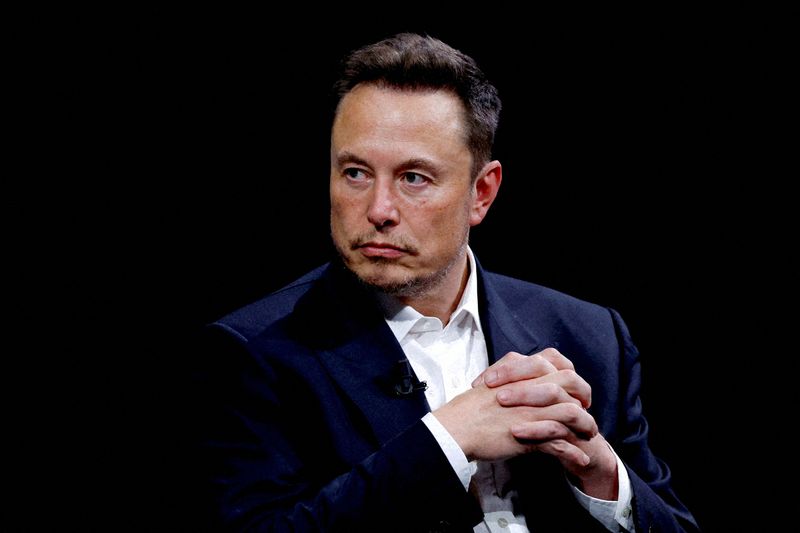By Arsheeya Bajwa and Tom Hals
(Reuters) -Tesla on Wednesday asked shareholders to reaffirm their approval of CEO Elon Musk's record-breaking $56 billion compensation that was set in 2018, but was rejected by a Delaware judge in January.
The re-vote comes ahead of next week's quarterly earnings for Tesla (NASDAQ:TSLA), which is grappling with weak demand as well as a reputational hit to Musk from his political leanings and approval of an antisemitic conspiracy theory last year.
"Elon has not been paid for any of his work for Tesla for the past six years...," Board Chairperson Robyn Denholm wrote in a letter included in the regulatory filing. "That strikes us — and the many stockholders from whom we already have heard — as fundamentally unfair."
Tesla's board, which includes Musk's brother Kimbal Musk, has repeatedly come under fire for its close ties with the billionaire.
In seeking a re-vote, Tesla is using a section of Delaware law that allows companies to ratify actions that are technically defective such as selling stock before the board approves an increase in shares, but not always controversial.
The board's special committee, which was formed to insulate the process of setting the pay from allegations of Musk's influence, said it cannot predict if its "novel" approach of getting a re-approval would be proper under Delaware law.
The largest pay package in corporate America has no salary or cash bonus and sets rewards based on Tesla's market value rising to as much as $650 billion over the next 10 years from 2018.
Tesla in 2018 said the grant could be worth $56 billion, though the amount depends on Tesla's stock price. The package currently is worth about $40 billion.
Tesla shares fell nearly 2% after the company's latest move, putting its market value on track to close below $500 billion for the first time in about a year.
AFTER RE-VOTE, MUSK MAY APPEAL
Musk's pay was rejected by Judge Kathaleen McCormick (NYSE:MKC) of Delaware's Court of Chancery, who termed the compensation as "an unfathomable sum" that was unfair to shareholders.
If Tesla shareholders vote in favor, it would not automatically entitle Musk to the money, Eric Talley, a Columbia Law School professor, said.
Approval would fix the flawed 2018 shareholder vote process, Talley said, but Musk would need to appeal to overturn the findings that he controlled the negotiation process that led to the record-breaking compensation.
Musk is expected to appeal the ruling later this year after the trial court determines how much the shareholder's legal team should be paid by Tesla.
The original pay package negotiations were found by judge McCormick to have been heavily influenced by Musk, who after the ruling tweeted - "Never incorporate your company in the state of Delaware".
Brian Dunn, a visiting lecturer in Cornell University’s School of Industrial and Labor Relations who consults boards on compensation, said the new vote was evidence the board was compromised.
“No one has ever said he shouldn’t get paid, but let’s remember the initial plan was flawed beyond its unprecedented magnitude,” Dunn said.
On Wednesday, Tesla also urged investors to approve its plan to move the company's state of incorporation from Delaware to Texas, potentially escalating a tussle between Musk and the state of Delaware.
Earlier this year, Musk shifted the location of incorporation of his rocket company SpaceX to Texas and brain-chip startup Neuralink to Nevada from Delaware.
Tesla has also proposed board re-appointments for Kimbal Musk and James Murdoch, son of media tycoon Rupert Murdoch.
TESLA'S MOUNTING CONCERNS

Tesla's shares have lost more than 36% of their value so far this year as electric-vehicle sales slowed down globally.
Developments such as scrapping plans for an affordable EV and deciding to cut at least 10% of its staff have also left analysts questioning the company's strategy.